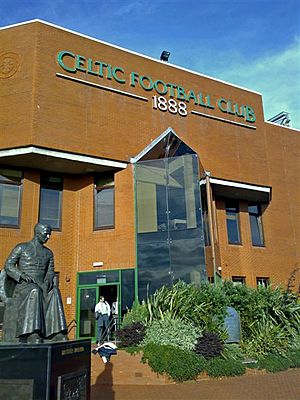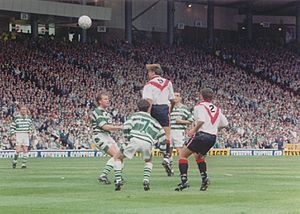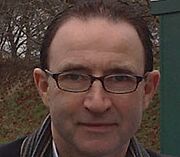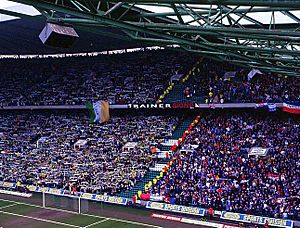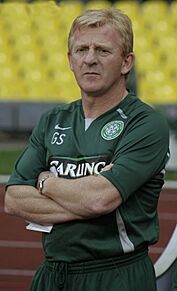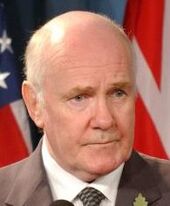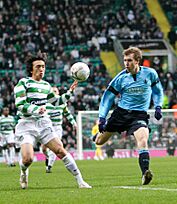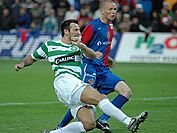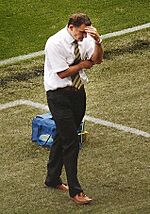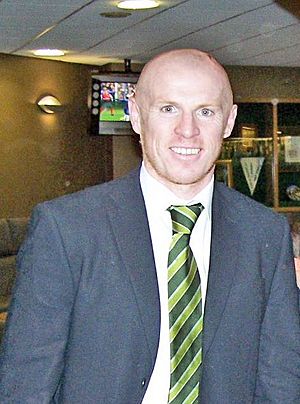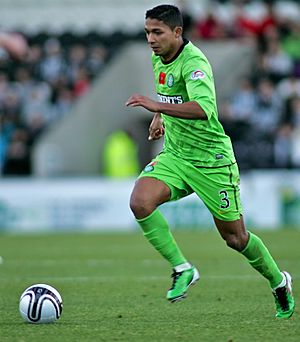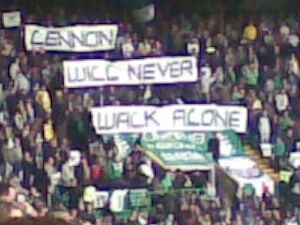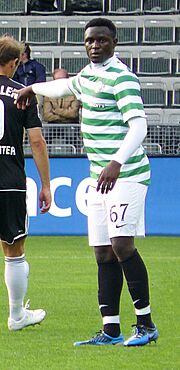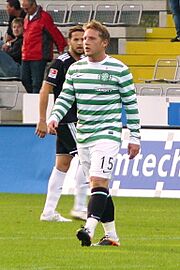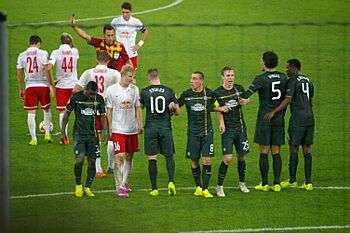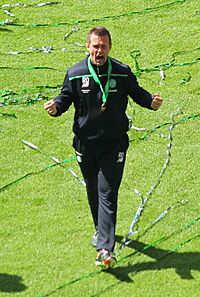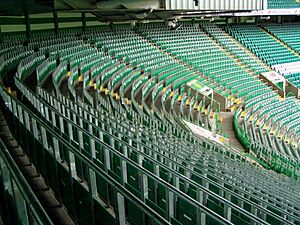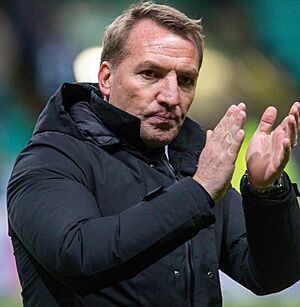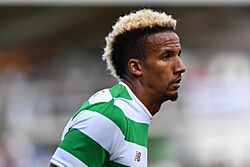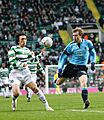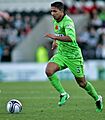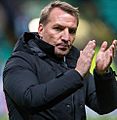History of Celtic F.C. (1994–present) facts for kids
Celtic Football Club is a famous Scottish football team that always plays in the top league, currently called the Scottish Premiership. The club started in 1887 and played its first game in 1888. Celtic plays its home games at Celtic Park, where they moved in 1892.
By 1994, Celtic was facing tough times both on and off the field. A businessman named Fergus McCann took control of the club from the families who had owned it for a long time. The club became a public company and raised £14 million by selling shares. This money helped rebuild Celtic Park into a huge all-seated stadium that can hold 60,000 fans, making it the biggest football stadium in Scotland.
The team got much better in the years that followed. In 1998, they won the league title, which was their first championship in ten years. When Martin O'Neill became manager in 2000, Celtic became the strongest team in Scotland. They won three league titles in five years and even reached the UEFA Cup Final in 2003. In the 2005–06 season, Celtic's home games had an average of 58,149 fans. This made them one of the most attended clubs in the United Kingdom at the time. Celtic was very dominant in the 2010s. They won nine league titles in a row again, went undefeated in all domestic competitions in the 2016–17 season, and won four domestic trebles in a row (winning the league, Scottish Cup, and League Cup all in one season).
Celtic is currently managed by Brendan Rodgers.
Contents
A New Start for Celtic (1994–1999)
In 1994, Celtic was in serious financial trouble and almost went bankrupt. However, Fergus McCann, a businessman living abroad, stepped in and bought the club. He took control just minutes before it was too late.
At this time, the club owed about £7 million. Not many fans were coming to games, with attendance often below 20,000. McCann changed Celtic from a private company to a public one (Celtic PLC). He then sold shares to the public, raising £14 million. This was one of the most successful share sales in British financial history.
Tommy Burns Takes Charge
After McCann took over, he hired former Celtic player Tommy Burns as manager in 1994. In Burns' first season, Celtic played their home games at Hampden Park because Celtic Park was being rebuilt. The team didn't do well in the league, but they won their first trophy in six years. They beat Airdrie 1–0 in the Scottish Cup Final in May 1995. The winning goal was scored by Pierre van Hooijdonk.
The next season, Celtic returned to their rebuilt home at Celtic Park. A new player, Andreas Thom, joined for a club record fee of £2.2 million. Before a friendly game, player Tony Mowbray started the "huddle" ritual. This is where players gather in a circle before a match to show teamwork. Even though Mowbray left soon after, the pre-match huddle is still a tradition for Celtic players today.
Tommy Burns' team played an exciting, attacking style of football. Van Hooijdonk and Thom formed a strong partnership up front. The midfield, led by Paul McStay and John Collins, played attractive football. Celtic only lost one league match in the 1995–96 season, but they couldn't stop Rangers from winning their eighth league title in a row.
Fans wanted the club to spend more money on players to stop Rangers from matching Celtic's "nine-in-a-row" record. McCann was sometimes criticized for not spending enough. However, in 1996, new players like Jorge Cadete and Paolo Di Canio joined the club.
The 1996–97 season was tough for Tommy Burns as Rangers got closer to their ninth league title. Despite great individual performances from Van Hooijdonk, Cadete, and Di Canio, Celtic struggled as a team. They finished the season without a trophy, and Rangers won their ninth league title in a row, matching Celtic's record.
McCann had disagreements with Van Hooijdonk, Cadete, and Di Canio over their contracts. He called them the "Three Amigos." McCann refused to meet their high demands, and all three players left the club, though Celtic received large transfer fees for them.
Tommy Burns was sacked with only three weeks left in the 1996–97 season. The club then made a surprising choice by hiring Dutch coach Wim Jansen. The traditional manager role was changed. Jansen became the head coach, focusing on tactics, while Jock Brown became the general manager, handling contracts.
Winning the League with Jansen
The summer of 1997 saw many changes to Celtic's squad. New players included Darren Jackson, Craig Burley, Regi Blinker, Marc Rieper, and most importantly, Swedish attacker Henrik Larsson from Feyenoord for £650,000. Club captain Paul McStay retired due to injury after 15 years with the club.
Rangers were expected to win the league in 1997–98. Celtic started poorly, losing their first two league matches, but soon improved. Marc Rieper and Alan Stubbs formed a strong defense, and Craig Burley was excellent in midfield, scoring important goals. Jonathan Gould became the first-choice goalkeeper and had a great season. Henrik Larsson had a shaky start, but he quickly became a key player, often playing just behind the main strikers.
Celtic stayed close to Rangers in the league. A 2–0 win over Rangers at New Year, with goals from Craig Burley and Paul Lambert, boosted Celtic's chances. Both teams dropped points as the season ended, but Celtic finally won the league title on the last day with a 2–0 win over St Johnstone. This was their first championship in ten years.
Despite this success, Wim Jansen resigned just two days after winning the title. He had difficulties working with Jock Brown and Fergus McCann.
Vengloš Takes Over
Jozef Vengloš was appointed as Jansen's replacement. Many fans were disappointed because of his previous poor record with Aston Villa. After early exits from European and League Cup competitions, and a bad start in the league, Celtic and Vengloš faced a lot of criticism. The club was also criticized for not signing enough new players. Jock Brown resigned in November 1998.
New players started to arrive later in the autumn, including Vidar Riseth, Johan Mjällby, Ľubomír Moravčík, and Mark Viduka. Celtic's luck began to change when they beat Rangers 5–1, with Larsson and Moravčík each scoring twice.
Vengloš got Celtic playing good football. He used Larsson as a main striker, which was a huge success, and Larsson scored 38 goals that season. The signing of Lubomir Moravčík was initially mocked by the media, but his skills quickly won over the doubters. Celtic improved in the league but still couldn't stop Rangers from winning the championship. Losing the Scottish Cup final to Rangers also showed the club hadn't made enough progress.
Vengloš resigned shortly after the season due to health reasons. He is remembered fondly by fans, especially for signing Moravčík.
In September 1999, Fergus McCann announced he was selling his majority stake in Celtic. He had promised to stay for five years. By this time, Celtic Park was a 60,000-seat stadium, and the club had 53,000 season ticket holders. Celtic was now a successful business, and the team was much better than when he took over. McCann sold his shares for £40 million, making a £31 million profit. After McCann left, Irish billionaire Dermot Desmond became the largest shareholder.
The O'Neill Years (1999–2005)
Barnes and Dalglish's Short Spell
The 1999–2000 season was a very difficult time for the club. Kenny Dalglish returned as General Manager, and former Liverpool player John Barnes became head coach.
Barnes had no experience managing a professional club. Fans' worries came true when Celtic's league challenge fell apart after the winter break. After poor results, including losing to Lyon in the UEFA Cup and Henrik Larsson breaking his leg, Rangers increased their lead. Calls for Barnes to be sacked grew louder.
On 8 February 2000, Celtic played Inverness Caledonian Thistle in the Scottish Cup. Despite being a lower-division team, Caley Thistle won 3–1 in one of the biggest upsets in Scottish Cup history. The next day, Barnes was sacked.
Kenny Dalglish took over as head coach until the end of the season. Celtic's league form got even worse, and they finished 21 points behind Rangers. A League Cup final victory over Aberdeen was the only positive in a very embarrassing period for the club.
Martin O'Neill Arrives
Martin O'Neill, a former European Cup winner with Nottingham Forest, became Celtic's manager in June 2000. He took full control of all team matters, bringing back the traditional "manager" role. Kenny Dalglish was sacked.
Over the summer, O'Neill bought Chris Sutton for a club record £6 million. Mark Viduka moved to Leeds United. Belgian defender Joos Valgaeren also joined to strengthen Celtic's defense.
O'Neill's new players quickly settled in. Sutton scored the winning goal in the first game of the season. Other key signings included Alan Thompson, Didier Agathe, Ramon Vega, Rab Douglas, and Neil Lennon. That season, Celtic won their first domestic treble since 1969, winning the League, Scottish Cup, and League Cup. O'Neill was only the second Celtic manager to achieve this. The season was also memorable for great results against rivals Rangers, including a famous 6–2 victory.
Henrik Larsson had an amazing season, scoring 53 goals in all competitions and winning the European Golden Shoe. Young Bulgarian midfielder Stiliyan Petrov also impressed, becoming the first foreign player to win the SPFA Young Player of the Year award.
Success in Europe
Celtic strengthened their squad for the 2001–02 season with the signings of Bobo Baldé and John Hartson.
On 8 August 2001, Celtic played Ajax in the Champions League qualifier. Celtic won the first leg 3–1 in Amsterdam. A nervous second leg at Parkhead saw Celtic lose 0–1, but they still moved on to the group stages for the first time since the tournament was redeveloped. This was the first of three times O'Neill's Celtic team reached the Champions League group stage.
Celtic lost their first Champions League group match 3–2 to Juventus in Turin. They then won their next two home matches against Porto and Rosenborg. Celtic's final group match was a memorable 4–3 win over Juventus at Parkhead. Despite finishing with nine points, Celtic didn't qualify for the next round and moved into the UEFA Cup. They lost to Valencia on penalties.
Celtic easily won their second straight league title in 2001–02, finishing 18 points ahead of Rangers. However, Rangers beat Celtic in both the League Cup semi-final and the Scottish Cup Final.
O'Neill's third season, 2002–03, was perhaps the most memorable, even without winning any trophies. Celtic lost the League Cup final to Rangers and were knocked out of the Scottish Cup by Inverness Caledonian Thistle. The league race was very close, with Celtic losing the title to Rangers on goal difference on the final day. However, Celtic made a big impact in Europe.
Celtic's European journey in 2002–03 started in the UEFA Cup after losing a Champions League qualifier. They easily beat FK Sūduva. In the next round, they faced Blackburn Rovers. Celtic won the first leg 1–0 at home. In the second leg, Celtic won 2–0, with goals from Larsson and Sutton. This was the first time Celtic had knocked out an English club in Europe in a long time.
Celtic then beat Celta de Vigo and VfB Stuttgart to reach the quarter-finals. They faced Premier League opponent Liverpool. The first leg at Celtic Park ended 1–1. In the return match at Anfield, Celtic won 2–0, with goals from Alan Thompson and John Hartson.
Celtic's first European semi-final since the 1970s was against Boavista. Celtic drew 1–1 at home, and a Henrik Larsson goal in the 80th minute of the return match in Portugal sent Celtic to the UEFA Cup final.
In May 2003, about 80,000 Celtic fans traveled to Seville to watch the final. Celtic lost 3–2 to Porto after extra time, despite two goals from Henrik Larsson. Celtic's defender Bobo Baldé was sent off late in the game. The thousands of Celtic supporters received widespread praise for their excellent behavior and were given Fair Play Awards from both FIFA and UEFA.
Continued Success
Celtic won the SPL title again in 2003–04 by a large margin, scoring over 100 goals. They also won 25 games in a row, a new British record. Celtic beat rivals Rangers five times that season.
Celtic qualified for the Champions League in 2003–04, but finished third in their group and dropped into the UEFA Cup. They beat FK Teplice and then faced Barcelona. Celtic won the first leg 1–0 at home. In the return match in Spain, young goalkeeper David Marshall and defender John Kennedy played outstandingly, helping Celtic hold Barcelona to a 0–0 draw and win the tie. Celtic's European run ended in the quarter-finals against another Spanish side, Villarreal.
Celtic easily reached the Scottish Cup final, conceding only one goal along the way. The final against Dunfermline on 22 May 2004 was Henrik Larsson's last match for the club. He scored twice as Celtic won 3–1, completing a league and cup double.
The following season (2004–05) was O'Neill's last. Celtic started well in the league and won their first game against Rangers, their seventh consecutive win in Old Firm matches. The league title race went down to the final day. Celtic needed to win away at Motherwell to guarantee the title. Celtic led for most of the match, but two late goals from Scott McDonald for Motherwell saw Celtic lose 2–1, handing the title to Rangers. Celtic did win the Scottish Cup, beating Dundee United 1–0 in the final. At the end of the season, Martin O'Neill left the club to care for his ill wife.
Martin O'Neill built the most successful Celtic team since the famous Lisbon Lions. Under his five-year leadership, Celtic won the league three times. He also won three Scottish Cups and one League Cup. In Europe, teams like Juventus, Porto, Valencia, and Barcelona all lost to Celtic in Glasgow. He led Celtic to their first European final in 33 years. Celtic also had an unbeaten run of 77 home matches from 2001 to 2004. His win percentage of 75% is the highest of any manager in the club's history. O'Neill's time as manager was the club's most successful period since Jock Stein.
Gordon Strachan and Tony Mowbray (2005–2010)
Gordon Strachan became manager in June 2005. He faced challenges, as the team was aging and still needed to replace Henrik Larsson. Strachan had a tough start, losing 0–5 to Artmedia Bratislava in his first game, which was Celtic's worst European result ever. However, Celtic quickly improved and won the SPL championship very quickly in the 2005–06 season, along with the League Cup. Shaun Maloney had an excellent season, winning both Player of the Year and Young Player of the Year awards. Celtic's home games that season had an average attendance of 58,149, making them one of the most attended clubs in the UK.
In the 2006–07 season, Celtic continued to dominate the Scottish Premier League. Strachan brought in younger, less expensive players to replace older, high-earning ones. The team was very consistent despite being young. By January, Celtic was 19 points ahead of Rangers. They won their second consecutive title on 22 April 2007, with a 2–1 win against Kilmarnock, thanks to a late free-kick from Shunsuke Nakamura.
That season, Strachan also led Celtic to the last 16 of the Champions League for the first time. They qualified after Nakamura scored a 30-yard free-kick against Manchester United in a 1–0 win at Parkhead. Celtic lost 0–1 to Milan in the last 16. On 26 May 2007, Celtic won the Scottish Cup for the 34th time, beating Dunfermline 1–0, completing another league and cup double. This was also captain Neil Lennon's last game as a Celtic player.
In September 2007, John Reid became chairman of Celtic. He was a lifelong supporter and called it "the greatest honour of my life."
Strachan's third season (2007–08) saw more team changes. Neil Lennon left, and Stephen McManus became captain. Celtic signed Scott Brown for £4.4 million, the largest transfer fee between two Scottish clubs. Scott McDonald also joined.
The 2007–08 season was a tight race with Rangers for the SPL title. Celtic led early on, but Rangers overtook them in winter. A 1–0 win for Rangers on 31 March 2008 left Celtic six points behind. A few days later, Neil Lennon returned to Celtic as a coach. A dramatic comeback began on 16 April with a home game against Rangers. Nakamura scored a spectacular goal, and despite Rangers equalizing and a saved penalty, Jan Vennegoor of Hesselink scored in injury time to give Celtic a 2–1 win. Celtic then caught up to Rangers, and on the final day, a Vennegoor of Hesselink header gave Celtic a 1–0 win at Dundee United, clinching the title. Strachan became only the third manager to win three successive league titles, and the victory was dedicated to the memory of Tommy Burns, who had died that week.
In the 2007–08 Champions League, Celtic qualified for the group stages by beating Spartak Moscow on penalties. Celtic won all three home games in the group stages, including a last-minute goal against Milan and an injury-time winner against Shakhtar Donetsk. They qualified for the round of 16 for the second season in a row. They lost to Barcelona 5–2 on aggregate.
In March 2009, Celtic won the League Cup, beating Rangers 2–0 in the final. However, Celtic failed to win the SPL title, finishing second to Rangers. Strachan resigned at the end of the season.
Tony Mowbray was announced as Strachan's replacement on 16 June 2009. He had played for Celtic before and was known for starting the "Huddle." He promised an attacking style of football. Things started well, and he won his first trophy, the Wembley Cup, shortly after joining. He brought in players like Marc-Antoine Fortuné, Landry N'Guémo, and Danny Fox.
Celtic needed to play two qualifying rounds to enter the Champions League group stages. After losing 1–0 at home to Dynamo Moscow, Mowbray led Celtic to a 2–0 win in Moscow, ending a long run of not winning away games in the Champions League. This was also the first time Celtic had won a European tie after losing the first leg at home. Celtic then faced Arsenal and lost.
However, things started to go downhill. Celtic began losing points to smaller teams in the league and exited the UEFA Europa League before Christmas. Despite a big squad shake-up in January, Tony Mowbray was sacked after a 4–0 defeat by St Mirren on 24 March 2010. Neil Lennon took charge for the rest of the 2009–10 season.
Neil Lennon's First Spell (2010–2014)
"Bring Back the Thunder"
Neil Lennon became caretaker manager after Tony Mowbray was fired, with former teammate Johan Mjällby as his assistant. Celtic was ten points behind Rangers when Lennon took over. Despite having no management experience, Lennon led Celtic to eight wins from their last eight league matches, finishing six points behind Rangers, whom they also beat 2–1. This boosted the club's morale. Celtic's only chance for a trophy was the Scottish Cup, but they lost 2–0 to Ross County in the semi-final. After the match, Lennon said the players lacked "hunger and desire" and recommended a major clear-out of players.
On 9 June 2010, Lennon was officially announced as the new Celtic manager. He kept Mjällby as his assistant and brought in former teammates Alan Thompson and Garry Parker as coaches. Lennon stated his goal to "bring back the thunder" to Celtic Park.
2010–11 Season
Lennon made big changes to the Celtic team for the 2010–11 season. Many players left, including Aiden McGeady, who was sold for a Scottish record £9.5 million. In return, many talented, young, and less expensive players from other leagues were signed. Some experienced players also joined. Gary Hooper, Beram Kayal, and Emilio Izaguirre all had excellent seasons. Izaguirre won both the SPFA and Scottish Football Writers' Player of the Year awards. Goalkeeper Fraser Forster, on loan from Newcastle United, became the first-choice goalkeeper and helped set a new league record for most clean sheets.
Celtic was knocked out of the Champions League and Europa League early on. Celtic and Rangers both won their first eight league games. Celtic lost the first Old Firm match 3–1. However, Celtic won 2–0 at Ibrox in the New Year fixture and went on to win 15 of their 19 matches in the second half of the season. Despite this, draws and losses meant they lost the league by one point. However, Celtic had the best defense, conceding only 22 goals.
Celtic reached the finals of both domestic cups in 2010–11. They lost the League Cup final 2–1 to Rangers but won the Scottish Cup final 3–0 against Motherwell.
In 2011, Neil Lennon faced serious threats. Packages containing bullets were sent to him and two other Celtic players. Later, two parcel bombs were sent to Lennon. These bombs were described by police as designed to "kill or maim." The acts were widely condemned. Lennon and his family received 24-hour police protection. He also needed police protection at matches. During a game against Hearts, a man ran onto the pitch and attacked him, but Lennon was uninjured.
2011–12 Season
The 2011–12 season saw Celtic start their league campaign poorly. Rangers, despite financial concerns, topped the league for the first few months. Celtic lost 4–2 to Rangers in the first Old Firm game. By October 2011, Celtic was 15 points behind Rangers. On 15 October 2011, Celtic was 0–3 down at half-time against Kilmarnock. Lennon later said he would have resigned if they had conceded another goal. Instead, Celtic fought back to draw 3–3. Celtic then found their form, and by Christmas, they had closed the gap to Rangers to one point. This included a 1–0 win over Hearts, where Victor Wanyama scored his first goal for Celtic.
A Joe Ledley goal on 28 December 2011 gave Celtic a 1–0 win over Rangers at Parkhead, putting them two points clear. By February 2012, Celtic had increased their lead to four points. The title was almost secured when Rangers went into administration in February 2012, leading to a ten-point deduction. Celtic's unbeaten league run continued until 25 March 2012, when Rangers won 3–2. The title was eventually secured with a 6–0 win over Kilmarnock. Celtic then comfortably beat Rangers 3–0 at Parkhead in a match where Celtic fans displayed banners mocking Rangers' financial problems.
The domestic cup tournaments were disappointing. Celtic reached the League Cup final but lost 1–0 to Kilmarnock. In the Scottish Cup, Celtic reached the semi-final but lost 2–1 to Hearts.
Celtic qualified for the Europa League group stages in unusual circumstances. Swiss side Sion beat Celtic in the qualifying tie, but Sion was thrown out of the tournament by UEFA for fielding ineligible players. Celtic was reinstated and finished third in their group. Despite not progressing, their European performances helped improve their domestic form.
A New Era (2012–13)
The summer of 2012 saw big changes in Scottish football. Rangers went into liquidation in June 2012. A new company was formed, but the re-formed Rangers were placed in the lowest tier of the Scottish Football League.
Celtic's 2012–13 league campaign was steady. Motherwell, Inverness Caley Thistle, and Hibernian had spells near the top, but by Christmas, Celtic had pulled comfortably clear. Celtic won their 44th League title on 21 April 2013 with a 4–1 win over Inverness CT. In the League Cup, Celtic easily beat Raith Rovers and St Johnstone, but St Mirren pulled off a surprising 3–2 win over Celtic in the semi-final.
In the Scottish Cup, Celtic beat Arbroath, Raith Rovers, and St Mirren. In the semi-final, Celtic won a thrilling 4–3 match after extra time against Dundee United. Celtic met Hibernian in the Scottish Cup final on 26 May 2013. Celtic won the cup and clinched a League and Cup double with a 3–0 win, with Gary Hooper scoring twice.
As Scottish Champions, Celtic played in the 2012–13 Champions League. On 2 October 2012, Celtic got their first ever away win in the Champions League group stages, beating Spartak Moscow 3–2. Celtic's home match with Barcelona in November 2012 was during the club's 125th Anniversary week. The Green Brigade fan group organized a full stadium card display to celebrate. Goals from Victor Wanyama and 18-year-old Tony Watt gave Celtic a shock 2–1 win over Barcelona. Goalkeeper Fraser Forster had an amazing performance, earning him the nickname "La Gran Muralla" ("The Great Wall") from the Spanish media. Celtic secured their spot in the knock-out stages with a 2–1 home win over Spartak Moscow. Celtic then faced Juventus but lost 5–0 on aggregate in Spring 2013. Despite the score, Celtic and Neil Lennon were praised for their Champions League campaign.
2013–14 Season
Over the summer, Gary Hooper, Kelvin Wilson, and Victor Wanyama were sold. Wanyama was sold for a Scottish record fee of £12.5 million. Neil Lennon rebuilt his squad by signing Virgil van Dijk, Amido Baldé, and Teemu Pukki.
Celtic again started their season in the Champions League qualifiers, beating Cliftonville and IF Elfsborg. They faced Shakhter Karagandy and lost the first leg 2–0 away. Celtic made a comeback in the home leg, winning 3–0 with goals from Kris Commons, Georgios Samaras, and James Forrest in the 90th minute, to reach the group stages. However, the group stage campaign was poor, with only one win (2–1 against Ajax) and a 6–1 loss away to Barcelona, their heaviest European defeat.
The domestic campaign had ups and downs. By late February, Celtic had not lost a single league game. However, they went out of the League Cup (0–1 to Greenock Morton) and the Scottish Cup (1–2 to Aberdeen), both at Celtic Park. Celtic also struggled to find a good strike partner for Anthony Stokes. Neil Lennon signed Leigh Griffiths and Stefan Johansen in January 2014. Joe Ledley left for Crystal Palace.
On 2 February 2014, goalkeeper Fraser Forster set a new club record of 11 league clean sheets in a row. On 22 February, he broke the Scottish League record of 1155 minutes without conceding a goal. Forster's clean sheet run ended at 1,256 minutes against Aberdeen on 25 February 2014, as Aberdeen beat Celtic 2–1.
Celtic finished the season as league champions again, their third consecutive title, scoring 102 goals. Kris Commons was the top scorer in Scotland with 32 goals and won both the PFA Scotland and Scottish Football Writers' Player of the Year awards.
On 22 May 2014, Neil Lennon announced he was leaving Celtic after four years as manager.
Ronny Deila (2014–2016)
Norwegian Ronny Deila was appointed manager of Celtic on 6 June 2014. Former Celtic midfielder John Collins became his assistant.
2014–15 Season
Deila's first competitive match was a 1–0 win against KR Reykjavik in a Champions League qualifier. Celtic easily won the return match 4–0, but were then beaten 6–1 on aggregate by Legia Warsaw. However, Celtic were given a second chance when it was found that Legia had used a player who wasn't allowed to play. UEFA awarded the game 3–0 to Celtic, making the aggregate score 4–4, and Celtic went through on away goals. Despite this luck, Celtic lost 2–1 on aggregate to Maribor in the final qualifier and dropped into the Europa League.
Celtic's early league performances were not convincing, but they improved as the season went on and also qualified from their Europa League group. Deila won the Manager of the Month award for November 2014. By February 2015, Celtic had won 15 of their last 17 domestic games and comfortably beat Rangers 2–0 in the League Cup semi-final. Celtic played Inter Milan in the Europa League round of 16. They drew 3–3 at Parkhead in a thrilling game, then lost 1–0 in Milan, going out on aggregate. In the league, Celtic thrashed Aberdeen 4–0 on 1 March to go six points clear. This turnaround in form changed many critics' opinions of Deila.
In March 2015, Celtic agreed a new kit deal with New Balance, believed to be the biggest kit contract in the club's history.
Deila won his first trophy at Celtic on 15 March, beating Dundee United 2–0 in the League Cup final. Kris Commons scored first, and James Forrest added a second goal. Celtic's chance for a domestic treble ended when they lost to Inverness Caledonian Thistle in the Scottish Cup semi-final on 19 April 2015. The match was controversial because of a handball by an Inverness defender that was not called. Celtic eventually lost 3–2 after extra-time.
Celtic clinched their fourth consecutive league title in May.
2015–16 Season
Celtic again tried to qualify for the Champions League. They beat Stjarnan and Qarabağ but lost 4–3 on aggregate to Malmö FF in the final play-off round. For the second season in a row, Celtic dropped into the Europa League. Their Europa League campaign was poor, with individual errors leading to dropped points in every match. Celtic failed to qualify, finishing last in their group without a single victory.
Deila was criticized for Celtic's poor European performance and inconsistent league results. In April 2016, Celtic lost 5–4 on penalties to Rangers in the Scottish Cup semi-final after a 2–2 draw. Three days later, Deila announced he would resign once the season finished. Nevertheless, Deila led Celtic to their fifth consecutive League championship, clinching the title on 8 May with a 3–2 win over Aberdeen. Celtic finished the season with a strong 7–0 win over Motherwell, with Deila leaving on a high note. The seventh goal was scored by debutant Jack Aitchison, who at 16 years and 71 days old became the youngest player and goalscorer for the club.
Striker Leigh Griffiths had an outstanding season, scoring 40 goals and winning Player of the Year awards. Young Kieran Tierney also emerged as a promising player, becoming first-choice left-back and making his Scotland debut.
Brendan Rodgers: Invincibles and Trebles
On 20 May 2016, Brendan Rodgers was confirmed as the new manager. He had previously managed Swansea City and Liverpool. Chris Davies became assistant manager.
On 14 July 2016, Celtic officially opened their new 2,600-capacity "rail seating" area at Celtic Park, becoming the first British club to have one. This allows fans to stand safely.
2016–17 Season
Celtic's first competitive match under Rodgers was a 1–0 loss to Gibraltarian team Lincoln Red Imps in a Champions League qualifier. This was called a "humiliation." However, Celtic quickly recovered, winning the second leg 3–0 and going on to qualify for the Champions League group stages for the first time since 2013. New signings Scott Sinclair and Moussa Dembélé helped the club start strongly in the league. Sinclair scored in each of the first six league matches, and Dembélé scored a hat-trick in Celtic's 5–1 win over Rangers.
Their first Champions League match on 13 September 2016 was a tough experience, as Barcelona beat them 7–0, Celtic's heaviest European defeat. However, they restored some pride in the next game, holding Manchester City to a 3–3 draw at Celtic Park. Celtic finished last in their group and went out of Europe.
Celtic continued their unbeaten run in domestic competitions into the New Year. They won their 100th major trophy, beating Aberdeen 3–0 in the League Cup Final on 27 November 2016. Celtic's 5–2 win away at St Johnstone on 5 February 2017 extended their league lead to 27 points and was their 19th consecutive league win. They continued undefeated through March, extending their winning run to 22 league games, though they drew 1–1 with Rangers. Celtic clinched their sixth consecutive league title on 2 April 2017, with a record eight games to spare. As their unbeaten domestic run continued, they thrashed Rangers 5–1 on 29 April. Celtic's 2–0 win over Hearts on 21 May saw them finish 30 points ahead of Aberdeen, with a record 106 points. They became the first Scottish team to complete a top-flight season undefeated since 1899. On 27 May 2017, Celtic won their fourth treble by defeating Aberdeen 2–1 in the Scottish Cup final, with Tom Rogic scoring the winning goal in injury time. This meant Celtic went through the entire domestic season unbeaten.
2017–18 Season
Celtic entered the 2017–18 UEFA Champions League qualifiers and beat Linfield, Rosenborg, and Astana to reach the group stages. They only got 3 points in the group, but did win 3–0 away at Anderlecht, their first group stage win in 16 games. Celtic finished third in the group despite losing heavily to Paris Saint Germain.
On 26 November 2017, Celtic won their fourth consecutive domestic trophy, beating Motherwell 2–0 in the Scottish League Cup final. Celtic set a British record for consecutive unbeaten domestic games at 69, breaking their own record set in 1917. This run ended with a 4–0 loss to Hearts. Brendan Rodgers said his team had set a record that "may well never be beaten."
By finishing third in the Champions League group stages, Celtic qualified for the Europa League knockout round of 32, where they played Zenit Saint Petersburg. Celtic won the first leg 1–0 but lost 3–0 in Saint Petersburg and were knocked out.
On 29 April 2018, Celtic secured their seventh consecutive league title with a 5–0 win over Rangers. This win also extended Celtic's unbeaten run against Rangers to 12 games. Celtic's season ended on 19 May 2018 when they secured the first ever 'Double-Treble' (winning a treble in two consecutive seasons) in Scottish football history with a 2–0 Scottish Cup Final win over Motherwell.
2018–19 Season
In his third season, Rodgers led Celtic to another League Cup, beating Aberdeen in the final. By February 2019, the club was eight points clear in the league. However, on 26 February 2019, Rodgers surprisingly left Celtic to become manager of Leicester City.
Return of Neil Lennon
2018–19 Season
Neil Lennon returned to Celtic as caretaker manager until the end of the season. He helped Celtic win their eighth consecutive league title. Then, they beat Hearts 2–1 in the 2019 Scottish Cup Final to win the treble for the third season in a row (the "treble treble"). The following week, Lennon was confirmed as full-time manager for the second time.
2019–20 Season
In his first full season back, Neil Lennon led Celtic to a 1–0 win over Rangers in the 2019 Scottish League Cup Final, which was the club's tenth consecutive domestic trophy. They failed to qualify for the UEFA Champions League again, but had a successful group stage campaign in the Europa League, topping a European group for the first time. They twice defeated Lazio (2–1 in both games), with Olivier Ntcham's late winning goal in Rome being Celtic's first competitive victory in Italy. By March 2020, Celtic was 13 points clear in the league and on track for a ninth consecutive title. However, all professional football in Scotland was stopped due to the COVID-19 pandemic in the United Kingdom. On 18 May, the league season officially ended, and Celtic was awarded their ninth consecutive league title. The 2019-20 Scottish Cup was delayed until late 2020. Celtic and Hearts reached the final on 20 December 2020. The match went to penalty-kicks after a 3–3 draw, and Celtic won the shootout to clinch a fourth successive treble.
2020–21 Season
Due to the ongoing COVID-19 Pandemic, the 2020–21 season started with no fans in stadiums. Celtic had disappointing results in Europe, losing 2–1 at home to Hungarian side Ferencvárosi TC in the Champions League qualifiers. They dropped to the Europa League and were eliminated after losing 4–1 both home and away to Sparta Prague.
In the league, Celtic was trying to win their tenth consecutive league title. After a good start, Celtic began to struggle, losing to Rangers and dropping points against other teams. They were also knocked out of the League Cup by Ross County, ending a 35-game unbeaten cup run. This result led to fan protests. After another league loss to Rangers in January, the team traveled to Dubai for a training camp despite the pandemic. This move was criticized, and after a player tested positive for COVID-19, Lennon, thirteen players, and two staff members had to self-isolate. This meant they missed two matches, which Celtic drew. After further defeats, Celtic was 18 points behind Rangers by late February, ending their hopes of "ten in a row." Neil Lennon resigned after the defeat to Ross County. Assistant manager John Kennedy became interim manager.
Celtic drew Kennedy's second game, which confirmed Rangers as league champions and ended Celtic's run of nine consecutive league titles. A defeat to Rangers in the Scottish Cup ended Celtic's streak of four consecutive triumphs in that competition, meaning they finished the season without a trophy for the first time since 2010. In May, they suffered their largest derby defeat in a decade, losing 4–1 to Rangers.
Ange Postecoglou
On 10 June 2021, Ange Postecoglou was announced as the new manager of Celtic. His first few months involved many changes, with 12 first-team players leaving and 10 new players joining. Celtic lost three of their first six league matches but had high-scoring wins against Dundee and St Mirren. Improved form in October saw Postecoglou win the Manager of the Month award. New signings Jota and Kyogo Furuhashi played very well. In December, Celtic won the first domestic trophy of the season, beating Hibernian 2–1 in the League Cup Final. On 11 May 2022, in a 1–1 draw away at Dundee United, Postecoglou's Celtic won the Scottish Premiership, securing a League and League Cup double in his first season.
Images for kids
-
Celtic playing away to Red Bull Salzburg in the UEFA Europa League group stage in 2014.
-
Brendan Rodgers led Celtic to two consecutive domestic trebles.
See also


